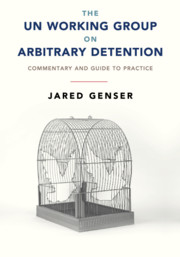Book contents
- The UN Working Group on Arbitrary Detention
- Reviews and Endorsements for The UN Working Group on Arbitrary Detention:
- The UN Working Group on Arbitrary Detention
- Copyright page
- Contents
- Figures
- About the Author
- Foreword
- Acknowledgments
- Abbreviations
- Part I. Background
- Part II. Individual Case Procedure
- Part III. Case Jurisprudence
- 4 Category I
- 5 Category II
- 6 Category III
- 7 Category IV
- 8 Category V
- 9 Detention Not Arbitrary
- Part IV. Additional Case Studies
- Table of Authorities
- Required Legal Materials
- Index
4 - Category I
No Legal Basis for Detention
from Part III. - Case Jurisprudence
Published online by Cambridge University Press: 20 September 2019
- The UN Working Group on Arbitrary Detention
- Reviews and Endorsements for The UN Working Group on Arbitrary Detention:
- The UN Working Group on Arbitrary Detention
- Copyright page
- Contents
- Figures
- About the Author
- Foreword
- Acknowledgments
- Abbreviations
- Part I. Background
- Part II. Individual Case Procedure
- Part III. Case Jurisprudence
- 4 Category I
- 5 Category II
- 6 Category III
- 7 Category IV
- 8 Category V
- 9 Detention Not Arbitrary
- Part IV. Additional Case Studies
- Table of Authorities
- Required Legal Materials
- Index
Summary
According to the WGAD’s Basic Principles and Guidelines, domestic law must authorize any and all restrictions on liberty.1 The WGAD will categorize a case as arbitrary under Category I “[w]hen it is clearly impossible to invoke any legal basis justifying the deprivation of liberty, as when a person is kept in detention after the completion of his or her sentence or despite an amnesty law applicable to him or her.”2 Category I cases typically center on the right to not be deprived of one’s liberty except on such grounds established by law, the right to not be held guilty for any criminal offense on account of an act or omission which did not constitute a criminal offense when it was committed, the right not to be tried twice for the same crime, situations where the detainee was granted amnesty but was not released, and in extraordinary rendition cases where prisoners are abducted and transferred across international borders outside of a lawful extradition hearing.
Keywords
- Type
- Chapter
- Information
- The UN Working Group on Arbitrary DetentionCommentary and Guide to Practice, pp. 109 - 126Publisher: Cambridge University PressPrint publication year: 2019

